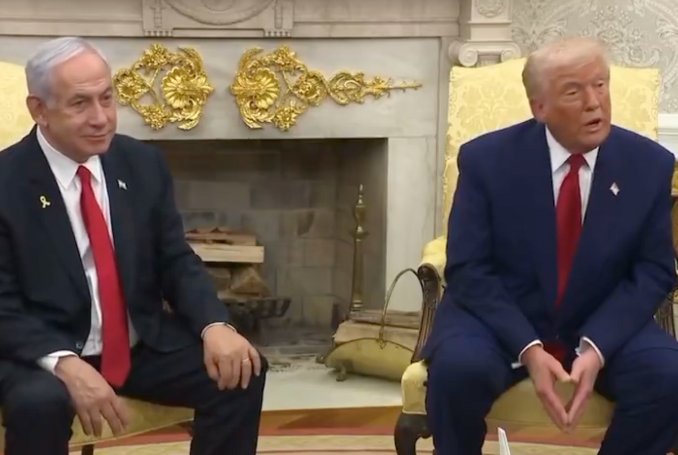
By Helmy Moussa
This article by Helmy Moussa, writing for Al Jazeera, explores how Trump’s tariffs and the ongoing war are wreaking havoc on Israel’s economy.
US President Donald Trump shocked the Israelis in general, and Prime Minister Benjamin Netanyahu in particular, not only when he added Israel to the list of countries subject to high tariffs, but also by refusing to respond quickly to requests for a reduction.
Many understood from this stance, which came at the height of Israel’s belief that it had the full support of the White House and its occupants, that from now on, Trump would not offer any reductions, including to Israel, in regard to the economy. This effectively means delivering a real economic blow to Israeli industry, particularly in sectors like medical equipment, electronics, pharmaceuticals, and diamonds.
When an Israeli reporter asked President Trump whether he would cancel the tariffs on Israel, he responded in a way that caused a lot of concern. He said, “Maybe not,” and added, “Don’t forget, we help Israel a lot. We give Israel $4 billion a year, that’s a lot.” Trump then turned to Netanyahu and said, “By the way, congratulations. This isn’t bad. We give Israel billions of dollars a year. Billions. It’s one of the highest of anyone.”
Soon, those familiar with the inner workings of US-Israel relations understood this remark, recalling his statements before the elections about these aids and the need to stop them. What matters to Trump first and foremost are interests, not values, and this truth was reinforced during his second presidential term.
Even when they read, about a week ago, the list of countries Trump intended to impose new tariffs on, Israel was ranked 18th among 25 countries. There were many meanings behind Trump’s words and hints about this group: “These are the worst offenders”, who “looted, pillaged, raped, and plundered” the United States over the years.
Yoav Karni writes in Globes that the tariffs imposed by Trump are not intended to eliminate the trade deficit, nor to settle the rules of the game. On the contrary, according to Karni, the purpose of these sanctions is to tilt the playing field sharply in favor of the American side. Trump’s accusation of the countries that benefited from US aid of theft is merely a translation of his view of aid as a debt that must be repaid.
In Karni’s view, “this is exactly how Trump sees any American aid, regardless of the recipient, if it is given without needing repayment. This is why he fundamentally denied the aid his predecessor gave to Ukraine. $100 billion as a gift? The president, even before returning to office, stated that every cent given to any country must come back to America with interest”.
Trump had said even before his return to the presidency that every cent given to any country must come back to America with interest. Experts like Micha Afni in Maariv argue that Israel should now give up US aid because it makes it subservient to the US administration.
Afni wrote, “In the conservative part of the United States, a broad movement called ‘America First’ has emerged. It seeks to reduce foreign aid and focus on its own borders and citizens economically.”
JD Vance, a prominent vice-presidential figure in this movement, and Tucker Carlson, one of the key voices in conservative public discourse, both appreciate power, greatness, and sovereignty. They do not hate Israel, in fact, they do not want to see Israel dependent on the US security budget.
“If we continue to behave as if aid is an eternal right, we will lose the support of those who truly believe in us. But if we voluntarily and proudly give it up, we will earn their trust, respect, and commitment for years to come.”
Adrian Bailot in Calcalist noted that the Israeli leadership was once again surprised by US actions that hurt Israeli exports to America, amounting to $14 billion, excluding diamond trade worth at least $2.5 billion annually. He wrote, “For a long time, there have been warnings, including on Calcalist’s website, about Trump’s intention to impose tariffs on Israel when he decides it’s time to take a major step on this issue. International trade and diplomacy experts have loudly and clearly sounded these warnings, including to Israeli decision-makers like the prime minister and the finance minister.”
The responses to these warnings were dismissive. Some claimed that “Trump loves Israel,” and thus would never impose tariffs on it. Another, more rational argument was that Israel and the US had signed a free trade agreement in 1985, and all tariffs were eliminated in January 1995. The Israeli Manufacturers Association had handed Netanyahu, just before his meeting with Trump, a document showing the advantages of urging Trump to reduce tariffs on Israel from 17% to 10%. According to this document, the new taxes could result in a $2.3 billion drop in demand and a 20% reduction in total exports to the US.
The document also showed that the most vulnerable sector would be the production of computers and electronic and optical devices, which would lose $900 million annually. The next most affected sector would be machinery and equipment manufacturing, which would lose $349 million per year, followed by petroleum and chemical products, which would lose $310 million annually.
According to the same analysis, between 18,000 and 26,000 workers in export sectors could lose their jobs as a result of the tariffs already imposed. However, the primary fear in Israel regarding Trump’s actions is not just their impact on exports, but the potential harm to direct investments in the Israeli economy. There is also concern that many production lines may migrate from Israel to the US to avoid these tariffs.
According to the latest employment report by the Innovation Authority, released last month, 2024 saw a contraction in Israel’s high-tech industry. The report indicates that since 2022, there has been a “recession” in the number of people working in high-tech. In 2024, there was a decrease of about 5,000 people, the first time in a decade. According to previous reports, since the outbreak of the war in October 2023 until July 2024, around 8,300 high-tech workers left Israel for a year or more. The Israeli Diamond Exchange also mobilized fully after the US actions, speeding up its shipments to America before the new tariffs took effect.
The heads of the exchange requested both Netanyahu and the finance minister to work on having the diamond industry exempted from the new measures. The Israeli diamond trade is among the most significant sectors of trade with the US, with diamond exports totaling $3.2 billion in 2024, about half of Israel’s total diamond exports. Naturally, these are not the only potential losses resulting from US actions. From the outset, significant losses have appeared for Israeli pension and credit funds that invest in the US stock market.
For example, pension savers have been forced to bear heavy losses in recent days, as more than 25 billion shekels (about $6 billion) were wiped out from their savings in just two days when the US benchmark index fell by 11%. Since the Standard & Poor’s 500 Index reached its last peak in mid-February, these losses have amounted to about 40 billion shekels (about $11 billion). The Tel Aviv Stock Exchange has been severely affected by the collapses and fluctuations on Wall Street, as well as the impact of Trump’s tariff plan on the markets.
For days, the local stock market closed with sharp declines: the TA-35 index fell by about 3.9%, reaching its lowest level in three months, marking its worst day since October 8, 2023. The TA-90 index also fell by 3.5% to its lowest level in three months. Amid the war, according to “Maariv,” about 2,000 millionaires left Israel in 2024, most of them moving to the US. The Israeli shekel has continuously depreciated since the announcement of US measures, not only against the dollar but also against the euro and other foreign currencies.
Even though the dollar index has fallen globally, the shekel’s depreciation against it confirms the volatility of the Israeli economy and its reliance on US support. The dollar surpassed 3.8 shekels, meaning that most goods imported to Israel will see a rise in prices, adding to the cost of living that has been exacerbated by taxes to cover the costs of the war.
Commentators have noted that US measures, coupled with the continuing security deterioration in Israel and its surroundings, will place additional burdens on the Israeli economy in the near future. Experts believe these developments will lower growth forecasts for Israel, weakening the job market and damaging savings and public morale. As for the impact of the war, it is clear that the US measures have highlighted the difficult economic situation in Israel, which is also due to the war. This was reflected in the annual report of the Central Bank, which warned of the growing gap between the debt-to-GDP ratio, which has increased significantly since October 2023.
According to experts, the war has pushed Israel backward, creating great pressure to cover the costs of the war. According to the Central Bank report, “the higher burden of military service, especially reserve service, will continue to exact a heavy economic toll.” The report also noted that the challenges following the war have been added to the problems the economy faced before the war, without changing them. Now, solving Israel’s main problems is more urgent than ever. “The higher defense expenditures in the near future and the need to maintain financial margins more strongly emphasize that adaptation is required even in the structure of government spending, which will reflect an appropriate priority scale for the challenges of the economy.”
Economic experts believe that the Gaza war has set Israel back considerably. In his annual State of the Union address before Congress, Trump declared, “We’ve been fooled for decades by nearly every country on earth, and we won’t let it happen again.” It is no coincidence that Israel was among the countries that “fooled” the US in his view, and despite his friendship with Israel, it was part of the retribution. He relishes hearing the pleas or requests from leaders of many countries, and Israel is no exception in his eyes this time.
(Al-Jazeera Arabic website – translated and prepared by the Palestine Chronicle)








Maybe that golden pager Nazinyahu gave to Trump will go BOOM! and it will be blamed on Iran, so Bibi has a reason to keep killing babies…